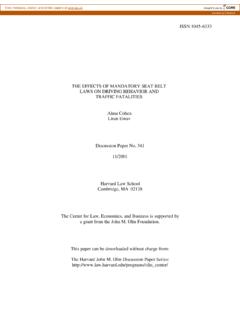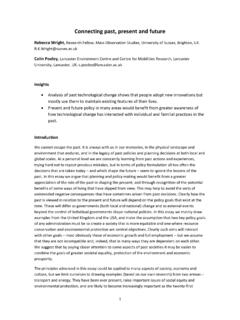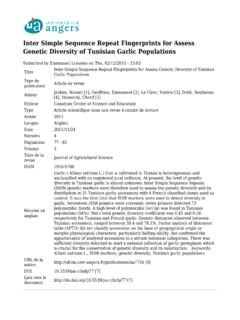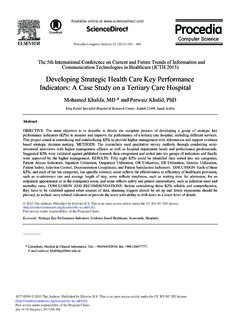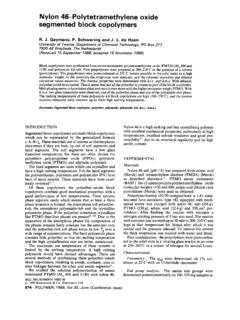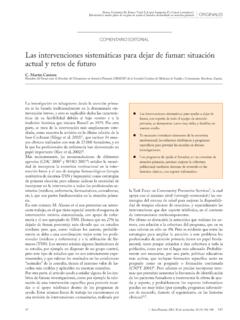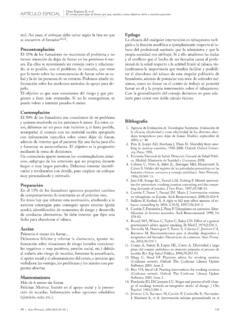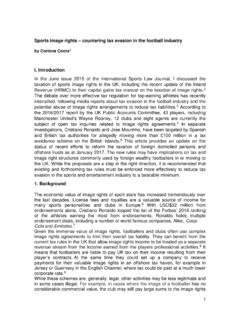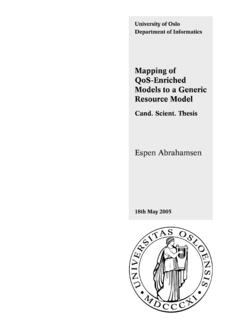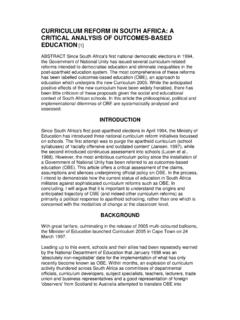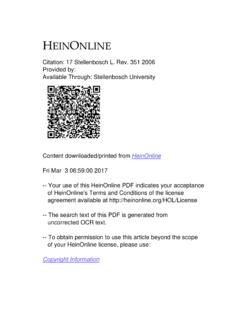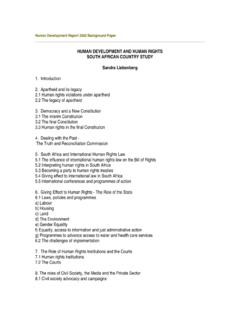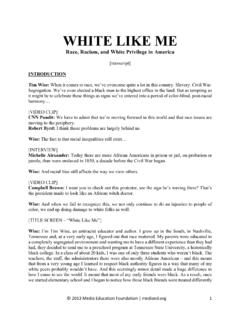Transcription of CHALLENGES TOWARDS CURRICULUM IMPLEMENTATION …
1 CHALLENGES TOWARDS CURRICULUM IMPLEMENTATION IN HIGH SCHOOLS IN MOUNT FLETCHER DISTRICT, EASTERN CAPE by NOMPUMELELO MANDUKWINI Submitted in accordance with the requirements for the degree of MASTER OF EDUCATION in the subject EDUCATION MANAGEMENT at the UNIVERSITY OF south AFRICA SUPERVISOR: PROFESSOR MOKOENA September 2016 brought to you by COREView metadata, citation and similar papers at by Unisa Institutional RepositoryDECLARATION Student number: 32010141 I, Nompumelelo Mandukwini declare that: CHALLENGES TOWARDS CURRICULUM IMPLEMENTATION in high schools in Mount Fletcher district, Eastern Cape is my own work and that all the sources that I have used or quoted have been indicated and acknowledged by means of complete references. _____ _____ SIGNATURE DATE i DEDICATION This study is dedicated to my late husband, Sicelo May, who gave me a reason to further my studies , my nephew, Athenkosi May who unwearyingly assisted me when my computer skills failed me and my granddaughter, Lumi May who always encouraged me to study so that she can have the TV remote control to herself.
2 Ii ACKNOWLEDGEMENTS I wish to express my sincere appreciation and gratitude to the following people for their support in the completion of my study: God, who gave me courage to succeed against all odds; Dr N. Mgijima, my first supervisor for her inspirational encouragement; Mount Fletcher District Department of Education for granting consent to conduct research; All the School Management Teams and teachers who participated in this study; and My supervisor, Professor S. Mokoena, for his patience, support and encouragement in completion of the study. iii SUMMARY Many changes especially in the education system were introduced when the ANC-led government came into power in 1994. CURRICULUM change emerged as key focus in restructuring the educational system and strong emphasis was placed on its IMPLEMENTATION .
3 People in leadership in schools were expected to play a pivotal role to ensuring its effective IMPLEMENTATION . CURRICULUM changes are intended to improve the quality of education for the benefit of learners and teachers. However, the CURRICULUM changes that have happened over the years in south African education system do not seem to achieve its intended goals. As a result, it might be argued that some of the changes are contributing to the CHALLENGES faced by the school management teams (SMTs), teachers and learners in schools. Poor capacitation of teachers in successfully implementing the CURRICULUM and availability of necessary resources needed are some of the contributing factors that impact on proper effective IMPLEMENTATION of CURRICULUM changes. Therefore, this qualitative study investigated the experiences and CHALLENGES faced by the school stakeholders in particular, SMTs and educators TOWARDS IMPLEMENTATION of CURRICULUM change in selected high schools in Mount Fletcher District in the Eastern Cape Province.
4 Data were generated by means of open-ended interview questions and documents review to provide a rich description and explanation of what CHALLENGES school stakeholders (SMT and teachers) face in managing the CURRICULUM IMPLEMENTATION in their particular contexts. It became apparent from the findings that there are major CURRICULUM CHALLENGES facing SMTs and teachers in managing the CURRICULUM IMPLEMENTATION in their schools. These included lack of resources, inadequate training and heavy workloads. However, measures were suggested to limit the CHALLENGES TOWARDS CURRICULUM IMPLEMENTATION in order for the SMTs and teachers to manage and implement the CURRICULUM effectively. The study concludes by pointing out that although SMTs and teachers try to perform their roles and responsibilities to ensure effective IMPLEMENTATION of CURRICULUM in their contexts, they still require training and on-going support to execute certain aspects of their duties.
5 KEYWORDS: CHALLENGES , CURRICULUM IMPLEMENTATION , high schools, school management team, teachers, capacity building. iv GLOSSARY OF ACRONYMS AND ABBREVIATIONS C 2005 _ CURRICULUM 2005 CAPS _ CURRICULUM Assessment Policy Statement CBA _ Concern Based Adoption Model DD _ District Director DET _ Department of Education and Training DoE _ Department of Education DSG _ Developmental Support Group HoD _ Head of Department LTSM _ Learner Teacher Support Material OBE _ Outcomes Based Education OD _ Organizational- Developmental Model ORC _ Overcoming Resistance to Change Model PPM _ Post Provisioning Model RNCS _ Revised National CURRICULUM Statement SMT _ School Management Team v TABLE OF CONTENTS DECLARATION i DEDICATION ii ACKNOWLEDGEMENTS iii SUMMARY iv GLOSSARY OF ACRONYMS AND ABBREVIATIONS v TABLE OF CONTENTS vi LIST OF TABLES xii LIST OF ANNEXURES xiii CHAPTER ONE.
6 OVERVIEW AND RATIONALE OF THE STUDY Introduction 1 The research problem 3 Aim of the study 4 Objectives of the study 4 Research questions 4 Main Research question 4 Sub-questions 4 Significance of the study 5 Research design and methodology 5 Research approach 5 Sampling 6 Data Collection 6 Document analysis 7 vi Data analysis 7 Limitations 7 Analysis and clarification of concepts 7 Experiences 7 Challenge 8 CURRICULUM 8 Communication 8 Capacity building 8 Resources 8 Change 8 Change management 8 Positional control 8 Township 9 Planning of the study 9 Limitations 9 Delimitations 10 Conclusion 10 CHAPTER TWO: LITERATURE REVIEW Introduction 11 CURRICULUM Management 11 CURRICULUM change and management in south African Schools before 1994 14 CURRICULUM change and management in south African Schools after 1994 16 Models of managing CURRICULUM change 19 Overcoming-Resistance to Change Model (ORC) 20 vii Organizational-Developmental Model (OD) 21 Concern-Based Adoption Model (CBA)
7 22 Systems Model 23 CHALLENGES facing CURRICULUM change and IMPLEMENTATION in other countries 23 Role of principals in some countries 24 Factors that can inhibit change and IMPLEMENTATION 26 Knowledge of planning 26 Lack of vision 27 Poor communication 27 Leadership style 27 Professional development and support 28 Resources 28 Increased workload 29 Role conflict 29 Teacher attitudes 30 Support structures for CURRICULUM management and IMPLEMENTATION 32 Knowledge of CURRICULUM 32 Human resources 33 Financial resources 34 Physical resources 34 Role of School Management Teams (SMT s) in CURRICULUM IMPLEMENTATION . 34 Monitoring 36 Conclusion 38 viii CHAPTER THREE: RESEARCH DESIGN AND METHODOLOGY Introduction 39 Description of the study 39 Research aim and objectives 40 Research question and sub-questions 40 Gaining access 41 Research design 41 Research approach 41 The qualitative approach as a method of research 41 Researcher as an instrument of research 43 The population and sampling 44 Description of the research sites and participants 44 Data collection 45 Research instruments 45 Interviews 45 Document Analysis 46 Ethical issues pertaining to the study 47 Limitations of the study 47 Trustworthiness of data 48 Credibility of the study 48 Measures to ensure trustworthiness 50 Processing data 50 Data analysis 50 Summary 51 ix CHAPTER FOUR.
8 RESEARCH FINDINGS AND ANALYSIS Introduction 52 Biographical information of schools and participants 52 Research questions and generated themes 53 Generated themes 54 Theme 1: Teaching experiences before 1994 55 Theme 2: Views on CURRICULUM changes after 1994 55 Theme 3: Role of SMT in managing CURRICULUM according to SMT members 59 Theme 4: Role of SMT in CURRICULUM management according to teachers 60 Theme 5: Professional development and support of teachers 62 Theme 6: CHALLENGES encountered in managing CURRICULUM 63 7 Theme 7: Support structures needed for CURRICULUM IMPLEMENTATION 67 Theme 8: Skills necessary for effective CURRICULUM IMPLEMENTATION 68 Document Analysis 69 Subject policy 69 Classroom observation sheets 69 School based moderation tool 70 Minutes of meetings on CURRICULUM 70 Conclusion 70 CHAPTER FIVE: SUMMARY, CONCLUSIONS AND RECOMMENDATIONS Introduction 72 x Overview of the chapters 72 Summary of the research findings 74 Theme 1: Teaching experiences before 1994 74 Theme 2: Views on CURRICULUM changes after 1994 75 Theme 3: Role of SMT in managing the CURRICULUM according to SMT members 75 Theme 4: Role of SMT in managing the CURRICULUM according to teachers 76 Theme 5: Professional development and support of teachers 76 Theme 6: CHALLENGES encountered in managing CURRICULUM 76 Theme 7: Support structures needed for CURRICULUM IMPLEMENTATION 77 Theme 8.
9 Skills necessary for effective CURRICULUM IMPLEMENTATION 77 Delimitation of the study 78 Limitations 78 Conclusions: 78 Recommendations 80 Further research 81 BIBLIOGRAPHY 82 ANNEXURES 91 xi LIST OF TABLES Table Biographical information of the schools and the participants Table Research question and generated themes Table Support structures needed for CURRICULUM IMPLEMENTATION xii LIST OF ANNEXURES A. Ethical clearance certificate B. Permission letter from the District Director C. Permission letter from the circuit 5 manager D. Permission letter from the circuit 7 manager E. Interview Guides xiii CHAPTER ONE INTRODUCTION AND ORIENTATION TO THE STUDY Introduction The south African formal education has been evolving for many years.
10 It started with the education that was offered by the missionaries. When missionaries arrived in the Cape, there was informal education that was going on among natives in the Cape. However, the missionaries did not acknowledge this education as it was not in line with their education. Missionary settlement in the Cape started in 1800. The first mission society to evangelise and educate at the Cape was the Moravian Church under George Schmidt ( south African History Online). Missionary education was then followed by the Bantu Education which was implemented after the passing of the Bantu Education Act of 1953. Bantu Education was the pillar of the apartheid project ( south African History Online, Bantu Education Act of 1953). Bantu Education Act of 1953 was passed by the Nationalist Party to separate black south Africans and the white south Africans.
